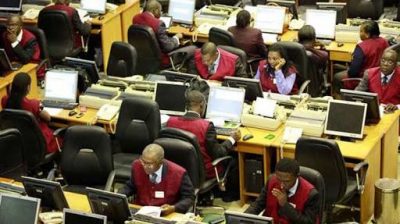ANALYSIS: NSE loses N150bn after re-election news — but is Buhari to blame?
Trading on the Nigerian Stock Exchange ended in the red on Monday after President Muhammadu Buhariannounced his re-election bid with large companies ending up as top losers.
Unilever, Lafarge, Dangote Cement, Guinness and Dangote Flour were the top five losers on the market.
Market capitalisation, which opened at N14.753 trillion, shed N150 billion to close at N14.603 trillion.
Also, the All-Share Index dipped by 411.98 points to close at 40,429.18 compared with 40,841.14 posted on Friday, April 6.
The last time All-Share Index was in this region was on January 9 when it stood at 40,362.97 points.
Unilever recorded the highest loss to lead the losers’ table, shedding N4.80 to close at N55 per share.
Lafarge Africa trailed with a loss of N3.20 to close at N41 in spite of N1.50 final dividend declared for the financial year ended Dec. 31, 2017.
Dangote Cement shed N2.90 to close at N252, while Guinness depreciated by N1 to close at N103.
Dangote Flour also lost 65k to close at N13.15 per share.
Should we blame poor financial results?
Towards the end of 2017 and in January 2018, the NSE was on a roll — breaking previously set records and getting ranked amongst the top five stock exchanges in the world.
By the end of the first quarter, all the five indices had dropped from their record highs with the industrial goods index taking the biggest hit.
However, the release of the annual audited reports might have worried or disappointed investors as one company after the other posted losses with the latest being Lafarge.
“Analysts attributed the development to sell-off and profit taking on high cap stocks that suffered losses after their share prices were adjusted for dividend declared and some companies that declared unimpressive earnings,” NAN reported on Monday.
Or is it Buhari?
The political atmosphere of a country has been known to affect investment decisions as it is often a sign of whether the investors trust the government in power to keep the economy stable.
As the 2019 general election draws near, there is bound to be a flurry of investment activities as a sign of confidence or distrust for the government in power.
Could Monday’s dip be a sign of the activities to come? (The Cable )


